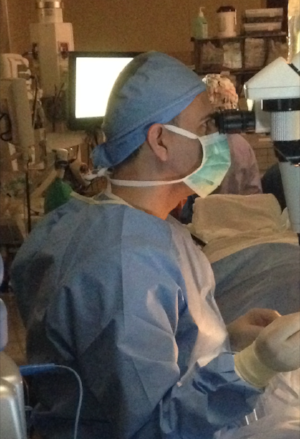What is LASIK?
LASIK, which stands for laser in-situ keratomileusis, is a popular surgery used to correct vision in people who are nearsighted, farsighted, or have astigmatism.
All laser vision correction surgeries work by reshaping the cornea, the clear front part of the eye, so that light traveling through it is properly focused onto the retina located in the back of the eye. LASIK is one of a number of different surgical techniques used to reshape the cornea.
Benefits of LASIK Eye Surgery
LASIK has many benefits, including:
It has been around for over 25 years and it works! It corrects vision. Around 96% of patients will have their desired vision after LASIK. An enhancement can further increase this number.
LASIK is associated with very little pain due to the numbing drops that are used.
Vision is corrected nearly by the day after LASIK.
No bandages or stitches are required after LASIK.
Adjustments can be made years after LASIK to further correct vision if vision changes while you age.
After having LASIK, most patients have a dramatic reduction in eyeglass or contact lens dependence and many patients no longer need them at all.
What Happens During LASIK Eye Surgery?
During LASIK eye surgery, an instrument called a microkeratome or femtosecond laser is used to create a thin flap in the cornea. The cornea flap is then painlessly peeled back and the underlying corneal tissue is reshaped using another laser. After the cornea is reshaped so that it can properly focus light onto the retina, the cornea flap is put back in place and the surgery is complete.
LASIK is performed while the patient is under local anesthesia in the form of eye drops (no shots, no needles) and usually takes about 10 minutes to complete. Patients may also request mild sedation. Plan to have someone drive you home after surgery.
What Are the Disadvantages of LASIK Eye Surgery?
Despite the pluses, there are some disadvantages to LASIK eye surgery:
LASIK is technically complex. Rare problems may occur when the doctor creates the flap, which can permanently affect vision. This is one reason to choose a surgeon who is very experienced at performing these surgeries.
LASIK can rarely cause a loss of "best" vision. Your best vision is the highest degree of vision that you achieved while wearing your contacts or eyeglasses.
What Should I Expect After LASIK Eye Surgery?
Your eyes will temporarily be dry even though they do not feel that way. Your doctor will give you prescription eye drops to prevent infection and inflammation and eye drops to keep your eyes moist. These drops may cause a momentary slight burn or blurring of your vision when you use them. Do not use any eye drops not approved by your eye doctor.
Healing after LASIK eye surgery usually occurs very rapidly. Vision may be blurry and hazy for the first day, but most patients notice improved vision within a few days of surgery.
Specific follow-up after the surgery varies from one surgeon to another. You will revisit the doctor for an evaluation 24 to 48 hours after LASIK eye surgery, as well as at regular intervals within the first six months.
How Should I Prepare for LASIK Eye Surgery?
Before LASIK eye surgery, you will meet with a coordinator or eye surgeon who will discuss what to expect during and after the procedure. During this session, your medical history will be evaluated and your eyes will be fully examined. Likely initial tests include measuring corneal thickness, refraction, corneal mapping, eye pressure, and pupil dilation. Once you have gone through the initial evaluation, you will meet Dr. Issa, who will answer any questions you may have. Afterwards, you can schedule an appointment for the procedure.
Surgery is performed on site at Laser Vision Care Center.
All Laser LASIK
Blade-Free, all-laser LASIK has become the method of choice for all those who seek the best vision correction available, but do not like the idea of a blade cutting into their eyes. Utilizing the latest technological advancements in laser technology, Laser Vision Care Center offers our patients the Blade-Free experience that provides a level of safety, precision and comfort, in an effort to obtain the highest quality of post-operative vision possible.
This tremendous level of control and customization makes our Blade-Free LASIK experience safer, speeds visual recovery, makes our patients more comfortable and contributes to better and more predictable visual outcomes.
Complimentary, No-Fee Consultation
At Laser Vision Care Center, we provide you with a complimentary, no-fee consultation where all your questions and concerns will be addressed. You will be provided with a free consultation, detailed information and whether or not you make for a good candidate for LASIK surgery.
Consults are approximately one and a half to two hours. If you wear soft contact lenses, please remove them 7 days prior to your visit and 4-6 weeks for hard contact lenses. Please bring sunglasses and/or someone to drive you home.
Dr. Issa has performed over 13,500 cataract and refractive surgeries.



